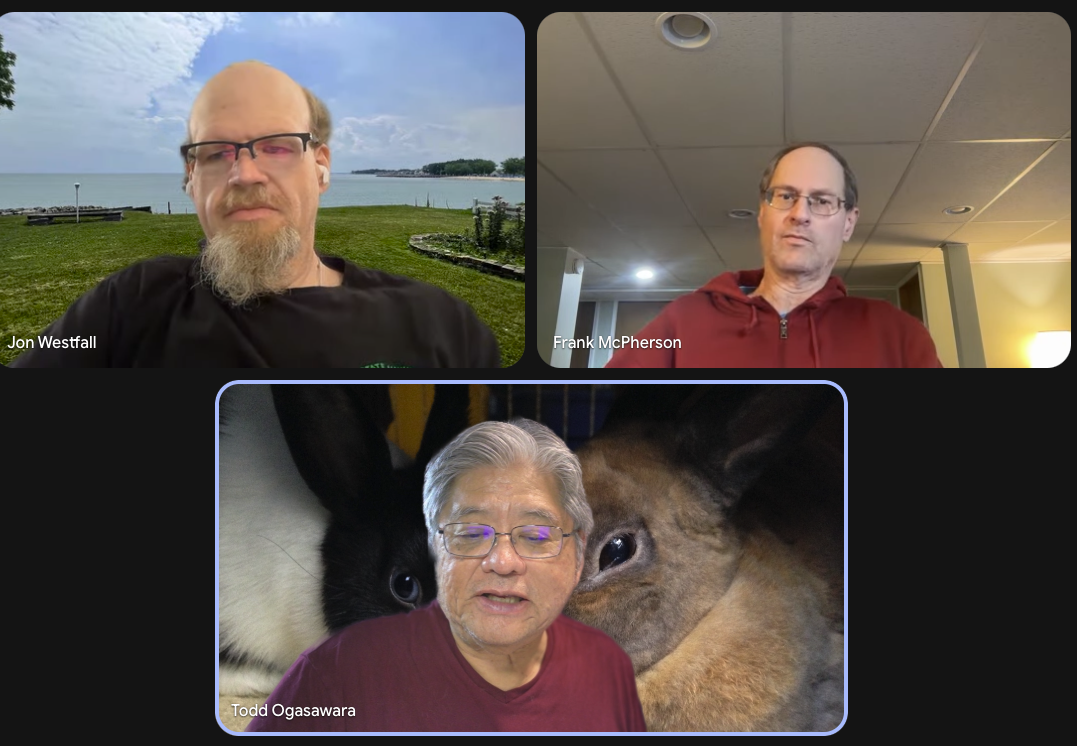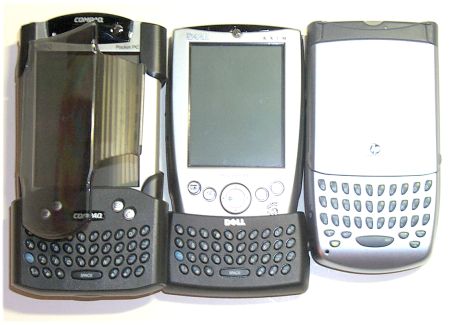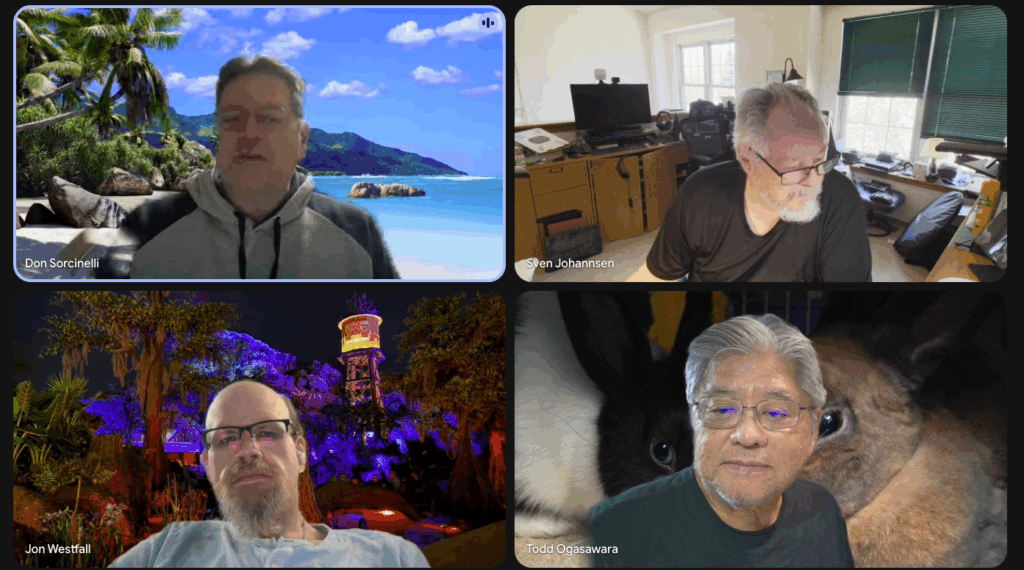
In this podcast Todd Ogasawara and Jon Westfall are joined by frequent guest panelist Frank McPherson. They discuss:
- Todd sorting out his Google AI Mode usage problem
- Google NotebookLM’s new information source discovery feature
- LegoGPT
- We can finally buy ebooks in the iOS Audible app
- Todd’s Surface Pro 11 rant
- Is Microsoft’s Windows 11 hardware requirements going to alienate Windows 10 users the way Windows Phone did to Windows Mobile users?
- Jon’s initial impressions of the Plaud NotePin
Podcast summary create by Google Gemini based on a transcript created by Adobe Podcast
Todd’s Gemini Account Mystery: Todd is still locked out of Google AI mode on his primary account but can access it through a secondary one, suspecting an old account configuration issue.
NotebookLM’s New “Discover Sources”: A new feature in Google’s NotebookLM is likened to having a personal reference librarian, quickly gathering and annotating potential web sources based on a topic description.
Nostalgia for Librarians: The pre-internet era’s reliance on knowledgeable librarians for research assistance is fondly remembered.
NotebookLM in Academia: John shares his positive experience using NotebookLM for academic purposes, allowing professors to analyze and compare information from multiple sources for students.
Local LLM Exploration: John has also been experimenting with local Large Language Models to handle even more sources than NotebookLM allows.
Reliability Concerns with AI: Frank expresses caution regarding the reliability and accuracy of information gathered from AI tools, especially when researching unfamiliar topics.
Safer Use of NotebookLM: Frank finds uploading PDFs to NotebookLM and querying within that confined source a more reliable way to use the tool.
Testable LLM Output: LegoGPT: A fascinating GitHub project, LegoGPT, can generate text-based instructions for building stable Lego models with a surprisingly high success rate (98%).
The Unzoom Struggle: A humorous moment as Todd grapples with camera zoom controls, resulting in close-ups of his nose.
Kindle App Book Purchases on iPhone: Due to an injunction in the Epic Games vs. Apple lawsuit, iPhone users in the US can now purchase Kindle books directly through the Kindle app.
The 30% App Store Cut: Apple’s long-standing 30% commission on in-app purchases and subscriptions was the core of the legal battle.
Audible vs. Kindle for Books: Todd primarily listens to audiobooks via Audible but still reads digital comic books.
Comixology Integration Woes: The merging of Comixology’s comic book viewing into the Kindle app is considered a downgrade by Todd.
Circumventing Purchase Restrictions: Previously, buying digital books on Apple devices often involved going directly to the Amazon website.
The Inevitable Shift: The panel believes Apple will likely lose the appeal and that allowing alternative purchase methods will become the norm.
Early Comixology Convenience: The pre-Amazon Comixology app allowed in-app purchases, which was convenient but costly.
Rising Comic Book Prices: Comic book costs have significantly increased over the years, making them less accessible for kids.
Surface Pro 11 Issues: Todd has experienced numerous problems with his Surface Pro 11, including printer driver malfunctions and inconsistent hub connectivity (display and power).
Co-pilot Plus AI PC Delay: Key AI features of the Surface Pro 11 are still unavailable months after purchase.
MacBook Air Reliability: Switching back to a MacBook Air resolved the connectivity issues experienced with the Surface Pro 11.
Windows Mobile’s Demise: The incompatibility of Windows Phone with existing Windows Mobile apps was a significant factor in its eventual failure.
Frank’s Early Android Adoption: Frank switched to Android (T-Mobile G1 in 2008) relatively early due to its open and flexible nature compared to the closed Apple ecosystem.
The Game-Changing iPhone: The announcement of the iPhone was recognized by many in the mobile tech space as a revolutionary device.
Android’s Openness: Android’s expandability (storage cards, removable batteries) was a key draw for early adopters like Frank.
Palm’s Evolution: Palm’s journey through its own OS, Windows Mobile, and WebOS is briefly touched upon.
HP’s Acquisition of Palm: HP eventually bought Palm.
Timeline of Mobile OS Developments: The podcast highlights the timeline of Windows Mobile 6, the iPhone announcement, the release of the Android G1, and Windows Phone 7.
Carrier Exclusivity: The iPhone’s initial exclusivity with AT&T and the challenges of SIM swapping on major carriers are recalled.
T-Mobile’s Sim Swapping Friendliness: T-Mobile was known for being more open to users swapping SIM cards between devices.
Verizon’s Late iPhone Entry: Verizon didn’t start selling the iPhone until 2011.
Palm Pre’s Carrier Limitation: The Palm Pre’s initial launch on Sprint, a smaller network, hindered its market reach.
Visual Voicemail’s Impact: The iPhone’s user-friendly visual voicemail system was a significant advantage over the traditional DTMF-based systems.
Carrier Control vs. Apple’s Approach: Carriers initially resisted Apple’s control over software and release schedules.
The Arrival of the App Store: The App Store, which debuted around the iPhone 3G era, revolutionized software distribution on mobile devices.
Early App Store Landscape: Before the iPhone’s App Store, app stores were primarily carrier-tied with limited third-party options.
Carrier Rebranding Practices: A brief mention of how carriers used to rebrand identical devices under different names.
Available via Apple iTunes.
MobileViews YouTube Podcasts channel
MobileViews Podcast on Audible.com



 In this podcast, Jon Westfall and I discuss:
In this podcast, Jon Westfall and I discuss: